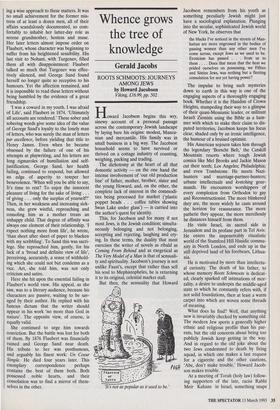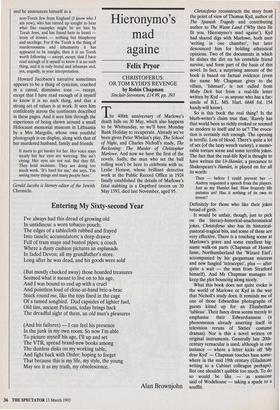Whence grows the tree of knowledge
Gerald Jacobs
ROOTS SCHMOOTS: JOURNEYS AMONG JEWS by Howard Jacobson Viking, f16.99, pp. 502 Howard Jacobson begins this wry, sinewy account of a personal passage across the contemporary Jewish landscape by laying bare his origins: modest, Mancu- nian and mercantile. His family was in small business in a big way. The Jacobson household seems to have survived or thrived on a cottage industry of counting, weighing, packing and trading.
The dichotomy at the heart of all that domestic activity — on the one hand the intense involvement of 'our old production line' of father, mother, brother, sister and the young Howard, and, on the other, the complete lack of interest in the commodi- ties being processed for market ('plastic poppet beads . . . coffee tables showing Swan Lake under glass') — is carried into the author's quest for identity.
This, for Jacobson and for many if not most Jews, is the Jewish condition; simulta- neously belonging and not belonging, accepting and rejecting, laughing and cry- ing. In these terms, the duality that most exercises the writer of novels as ribald as Coming From Behind and as exegetical as The Very Model of a Man is that of sensuali- ty and spirituality. Jacobson's journey is not unlike Faust's, except that rather than sell his soul to Mephistopheles, he is returning it to its original, celestial market stall.
But then, the sensuality that Howard Jacobson remembers from his youth as something peculiarly Jewish might just have a sociological explanation. Plunging into the secular, sophisticated Jewish world of New York, he observes that
the blacks I've noticed in the streets of Man- hattan are more engrossed in the bodies of passing women than any other men I've come across, except Jews as we used to be. Eroticism has passed . . . from us to them . . . . Does that mean that the heat we prided ourselves on possessing, we Fifties and Sixties Jews, was nothing but a fleeting consolation for not yet having power?
The impulse to bring such mysteries down to earth in this way is one of the engaging aspects of a thoroughly engaging book. Whether it is the Hasidim of Crown Heights, stampeding their way to a glimpse of their quasi-Messianic leader, or militant Israeli Zionists using the Bible as a ham- mer with which to stake their claim to dis- puted territories, Jacobson keeps his focus clear, shaded only by an ironic intelligence, the humour of a bruised optimist.
His American sojourn takes him through the legendary 'Borscht Belt,' the Catskill Mountain resorts where tough Jewish comics like Mel Brooks and Jackie Mason cut their teeth; Los Angeles; Philadelphia; and even Tombstone. He meets Nazi- hunters and marriage-partner-hunters; urbane intellectuals and kvetching gour- mands. He encounters worshippers of every complexion from Orthodox to gay and Reconstructionist. The more blinkered they are, the more widely he casts around the horizon for reassurance. The more pathetic they appear, the more mercilessly he distances himself from them.
He visits Israel, its sacred side in Jerusalem and its profane part in Tel Aviv. He enters the impenetrably ritualistic world of the Stamford Hill Hasidic commu- nity in North London, and ends up in the still deprived land of his forebears, Lithua- nia.
He is motivated by more than intellectu- al curiosity. The death of his father, to whose memory Roots Schmoots is dedicat- ed, clearly sparked off intimations of mor- tality, a desire to underpin the middle-aged state to which he constantly refers with, if not solid foundations, then at least a warm carpet into which are woven some threads of meaning.
What does he find? Well, that anything new is invariably checked by something old. The modern Jew sports a generally higher ethnic and religious profile than his par- ents, but the old concerns about being too publicly Jewish keep getting in the way. And in regard to the old joke about the two Jews condemned to death by firing squad, in which one makes a last request for a cigarette and the other cautions, `Abe, don't make trouble,' Howard Jacob- son makes trouble.
At a meeting of Torah (holy law) follow- ing supporters of the late, racist Rabbi Meir Kahane in Israel, something snaps and he announces himself as a
non-Torah Jew from England (I know who I am now), who has turned up tonight to hear what fine examples might be set him by Torah Jews, and has found here in Israel irony of ironies — nothing but blasphemy and sacrilege. For if the Torah is the thing of murderousness and inhumanity it has appeared to be tonight, then it is no Torah worth following — except, except, that I have read enough of it myself to know it is no such thing, and it is only brutal and inhuman and, yes, ungodly, in your interpretation.
Howard Jacobson's narrative sometimes appears to be a thing of cynicism, couched in a casual, dismissive tone — except, except that I have read enough of it myself to know it is no such thing, and that a strong set of values is at work. It sees him confidently across the continents described in these pages. And it sees him through the experience of being shown around a small Holocaust memorial museum in Lithuania by a Mrs Margolis, whose own youthful photograph is on display, along with that of her murdered husband, family and friends:
It starts to get harder for her. Her voice stays steady but her eyes are watering. She isn't crying. Her eyes are not red. But they fill. They hold moisture. They are doing too much work. 'It's hard for me,' she says, 'I'm seeing many things and many people here.'
Gerald Jacobs is literary editor of the Jewish Chronicle.



























































 Previous page
Previous page